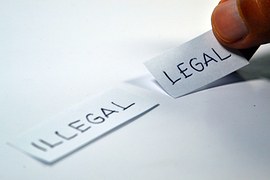Is It Illegal To Hack Into A Computer In Baltimore, MD?
Maryland law punishes the conduct that is informally known as “hacking”. Current law makes it a crime, standing alone, to gain access to someone else’s computer data, whether or not information is stolen. As Attorney Eric T. Kirk will tell you.

The law was “intended to make it a misdemeanor for a person intentionally and without authorization to access, attempt to access or cause access to a computer system” and to “to deter individuals from breaking into computer systems.” It is clear that personal privacy is the interest to be guarded by the statute. Briggs v. State, 348 Md. 470.
Section 7-302 of the Criminal Law Article prohibits the unauthorized access to computers and related technology. Under this section, it is illegal to:
Intentionally and without authorization:
- “access, or exceed the person’s authorized access to all or part of a computer network, computer control language, computer, computer software, computer system, computer service, or computer database; or
- copy, or possess, contents of all or part of computer network, computer control language, computer, computer software, computer system, computer service, or computer database”
Source: Section 7-302 of the Criminal Law Article
Accessing someone else’s computer without their permission, without a showing of more, is sufficient to sustain a conviction. A violation of this section is a misdemeanor, but can lead to imprisonment for three years, and a substantial fine. However, if the defendant engages in the prohibited conduct and the prosecution can show an additional, heightened intent – e.g. causing the malfunction or interrupting the operation of all or any part of a computer system, or destroying the data contained therein– enhanced penalties come in to play. Here, if the value of the damage exceeds $10,000, the crime is then considered a felony carrying 10 years and still carries 5 years where the dollar amount is less than 10,000.

Additionally, the section prohibits the intentional and unauthorized possession, use or dissemination of an access code or pin. Again, where the value of the damage exceeds $10,000, the crime is considered a felony carrying 10 years, and carries 5 years where the dollar amount is less than 10,000. Finally, if the State can demonstrate the individual charged has the intent to disrupt the functioning of the State, or power supply, the fines can increase to $25,000.
The hacking law defines “access”, the prohibited conduct, to include: “to instruct, communicate with, store data in, retrieve or intercept data from, or otherwise use the resources of a computer program, computer system, or computer network.”
Computer, the prohibited target, is defined as “an electronic, magnetic, optical, organic, or other data processing device or system that performs logical, arithmetic, memory, or storage functions” and includes a data storage facility.
A computer database is defined to include “a representation of information, knowledge, facts, concepts, or instructions that: is intended for use in a computer, computer system, or computer network; and is being prepared or has been prepared in a formalized manner; or is being produced or has been produced by a computer, computer system, or computer network.”
Source: Section 7-302 of the Criminal Law Article



